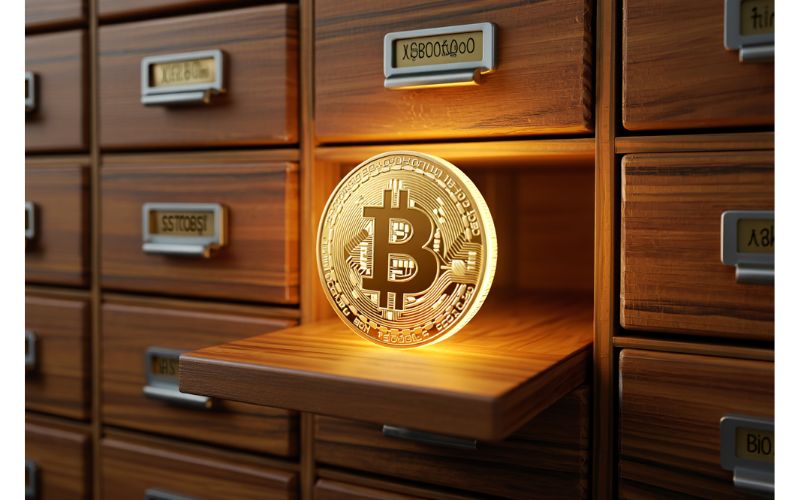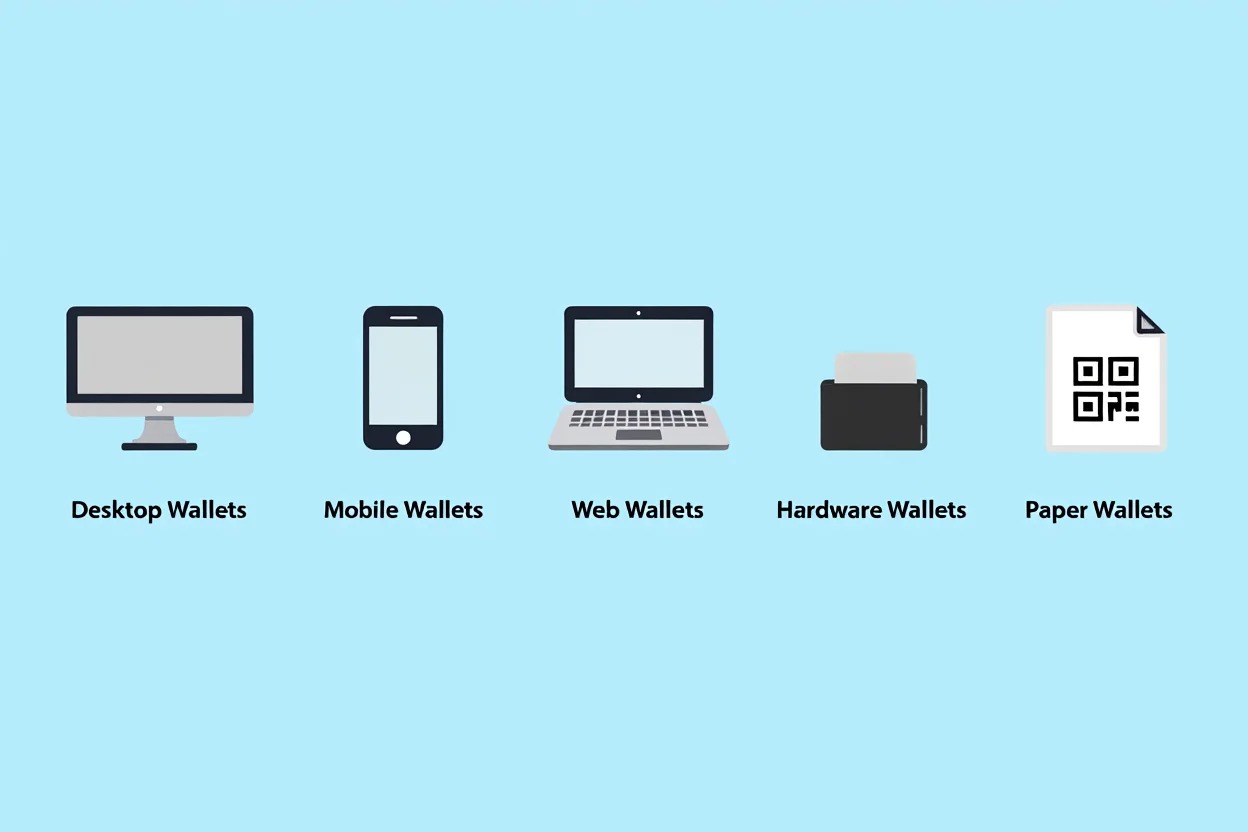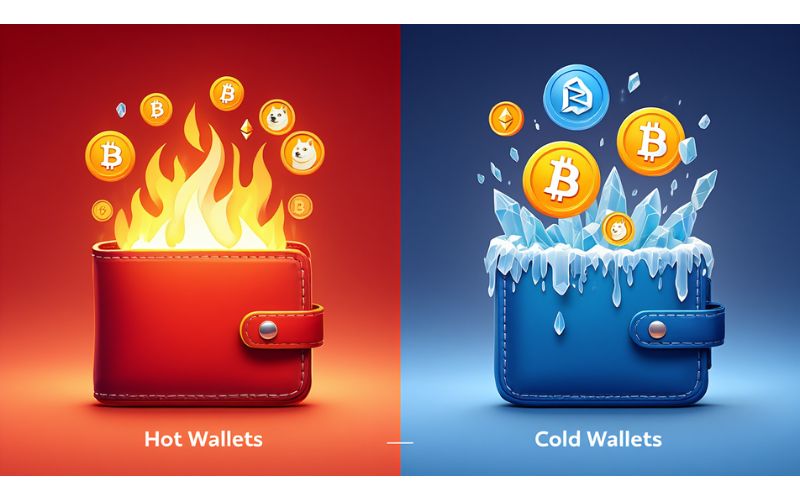“Not your keys, not your coins.” This mantra has become increasingly relevant in 2025 as Bitcoin adoption grows and so do security threats. With millions lost to exchange hacks, phishing scams, and misplaced passwords, understanding how do you store Bitcoins securely is critical for anyone holding BTC.
Whether you’re new to cryptocurrency or looking to upgrade your security, this guide will walk you through the best tools and practices for protecting your Bitcoin. Take control of your financial future today by learning to store your BTC safely starting now.
1. What does it mean to ‘store’ Bitcoin?
When people ask how do you store Bitcoins, it’s crucial to understand that you’re not storing the Bitcoin itself, but rather the private keys that give you access to it. Bitcoin lives on the blockchain, a decentralized public ledger. You prove ownership through two cryptographic elements:
- Public key – your wallet’s receiving address
- Private key – your secret access code to spend your BTC

What does store mean in bitcoins
Wallets don’t actually hold Bitcoin; they store and manage these keys. As Bitcoin expert Andreas M. Antonopoulos explains, “Bitcoin isn’t stored in a wallet, but the keys granting access to it are.” What does store mean in Bitcoins?
In short, to store Bitcoin means protecting your private keys with the right wallet and security practices. Lose those keys, and your Bitcoin is gone permanently.
2. Types of Bitcoin wallets explained
If you’re wondering how do you store Bitcoins securely, the answer often begins with choosing the right type of wallet. Each wallet option offers a unique blend of convenience, accessibility, and security. Let’s break them down in simple terms so you can confidently select one that fits your specific needs.

2.1 Desktop wallets
A desktop wallet is software you install on your personal computer or laptop. Widely used options include Electrum and Exodus. These wallets give you full control over your private keys and are generally considered safe as long as your device is free from malware. However, because they’re connected to the internet, they are still vulnerable to online attacks.
Best for: Users who prefer to manage their crypto on their computer and understand basic cybersecurity practices.
2.2 Mobile wallets
Mobile wallets are cryptocurrency applications installed directly on your smartphone. Examples include BlueWallet and Trust Wallet. These are great for quick access and everyday transactions, such as paying for goods or transferring small amounts of Bitcoin.
However, mobile wallets are riskier because phones can be lost, stolen, or infected with malware.
Best for: Beginners or frequent spenders who want portability, but not ideal for storing large amounts.
2.3 Web wallets (Browser-Based)
Web wallets are accessed through your browser and are hosted online, such as Blockchain.com or Coinbase Wallet. While they offer convenience and speed, the downside is that you don’t fully control your private keys, which are usually held by the provider. That means you’re trusting a third party with your funds.
Best for: People new to Bitcoin or those who prioritize ease of access over full control.
2.4 Hardware wallets (Cold Storage)
These are physical devices like the Ledger Nano X or Trezor Model T that store your private keys offline. Hardware wallets are considered one of the safest ways to store Bitcoins because they are immune to most online threats. Even if your computer is compromised, your private keys remain protected inside the device.
Best for: Long-term holders or anyone storing large amounts of Bitcoin who prioritizes maximum security.
2.5 Paper wallets
A paper wallet involves printing out your Bitcoin private and public keys on a physical piece of paper, usually in the form of QR codes. This method used to be popular, but it’s now considered outdated and insecure due to risks like fading ink, theft, or accidental damage.
Best for: Advanced users in the past; no longer recommended due to poor recoverability and fragility.
2.6 Multi sig wallets
Multi-signature wallets require approval from two or more private keys before a transaction can be completed. Think of it like having multiple padlocks on a safe, no one person can unlock it alone. This adds a powerful layer of security and is ideal for shared ownership situations like families, teams, or businesses.
Best for: Groups or individuals with complex storage needs who want extra protection against unauthorized access.
2.7 Custodial vs. non-custodial wallets
This is a major decision point when deciding how do you store Bitcoins:
- Custodial wallets (e.g., Coinbase) hold your private keys for you. They’re convenient but come with risk, since a third party could freeze your funds or hack them.
- Non-custodial wallets (e.g., Ledger, Electrum) give you full control, meaning you are responsible for safeguarding your keys.
Best for: Custodial wallets suit beginners; non-custodial wallets are ideal for those who value financial sovereignty.
Choose the type of wallet that suits your needs
Understanding your storage goals is crucial. Choose a wallet based on how often you transact, the amount of Bitcoin you hold, and your comfort level with technology. The method you choose when asking how do you store Bitcoin should balance convenience with control, there’s no one size fits all.
3. Hot wallets vs cold wallets
When asking how do you store Bitcoins, one of the first decisions you’ll face is whether to use a hot wallet or a cold wallet. Understanding the difference between these two wallet types is essential to choosing the right storage solution for your needs, especially if you’re managing large sums of Bitcoin or using it frequently.
3.1 What is a hot wallet?
A hot wallet is a type of wallet that stays connected to the internet at all times. This includes mobile wallets (like Trust Wallet), desktop wallets, and browser-based web wallets. Because they are always online, hot wallets are extremely convenient for fast, day-to-day access, ideal if you’re sending or receiving Bitcoin regularly.
However, the trade-off is security: being online exposes your wallet to potential cyber threats like malware, phishing, and hacks.

3.2 What is a cold wallet?
Unlike hot wallets, cold wallets are completely offline, offering maximum protection. It stores your private keys without any connection to the internet, making it immune to most types of online attacks.
Examples include hardware wallets like the Ledger Nano X or Trezor Model T, and paper wallets (though the latter are outdated and risky today). Cold wallets are ideal for long-term holders (HODLers) who want to protect large amounts of Bitcoin from digital threats.
Hot wallets vs cold wallets
Cold wallets require more setup effort, and you’ll need to connect them manually when sending BTC, but this extra step greatly increases security.
Feature-by-feature comparison
| Feature | Hot Wallet | Cold Wallet |
| Internet | Yes | No |
| Security Level | Moderate (risk of online hacks) | High (offline, secure) |
| Accessibility | Instant | Delayed (manual connection needed) |
| Ideal Use Case | Daily transactions | Long-term or high-value storage |
3.3 Choosing the right one
So, how do you store Bitcoins if you want the best of both worlds? Many experienced investors use a hybrid approach, keeping a small amount of BTC in a hot wallet for everyday use, while storing the majority in a cold wallet for maximum protection. This method combines convenience and security, allowing you to spend easily without exposing your entire portfolio.
Hot wallets are best for daily access and spending, but they carry higher risks. Cold wallets are better for storing larger amounts of Bitcoin safely over the long term. To protect your investment, always match your wallet type with your storage goals.
4. How do you store Bitcoins securely?
To truly protect your digital assets, follow these five essential steps:
Step 1: Choose the right wallet
For small amounts, a mobile wallet may suffice. For long-term or large-value storage, use a hardware wallet like Ledger or Trezor.
Example: Ledger Nano X supports Bluetooth and multiple coins, ideal for secure long-term storage.
Step 2: Set up your wallet
- Follow setup instructions carefully
- Generate your seed phrase (12–24 words)
- Write it down on paper or metal never store digitally
Step 3: Secure your private keys
- Use 2FA for all wallet platforms
- Encrypt backup files
- Store backups in fireproof safes or security boxes
“Most breaches occur due to poor key management not technical flaws,” says Charles Guillemet, CTO at Ledger
Step 4: Test your setup
Send a small transaction and test recovery to ensure everything works. Mistakes at this step can be irreversible.
Step 5: Maintain your setup
- Update firmware regularly
- Review recovery steps twice a year
- Keep up with crypto security best practices
Storing Bitcoin securely involves the right tools, proper backups, and proactive security maintenance.
5. Best practices for long-term Bitcoin storage
If you’re thinking about how do you store Bitcoin safely over the long haul, you need to look beyond what’s easy or convenient. Long-term holders, often called HODLers, should focus on durability, redundancy, and security. The goal isn’t just to keep Bitcoin accessible, but to make sure it’s protected from theft, damage, or human error. Here’s how to do that:
5.1 Use hardware wallets to keep Bitcoin offline
Hardware wallets are dedicated devices that safeguard your private keys by keeping them offline. This is the safest way to prevent remote hacking, malware, or phishing attacks. If you’re asking, how do you store Bitcoins in the most secure way possible, a hardware wallet like Ledger Nano X or Trezor Model T is the industry standard.
Why it matters: By removing internet access, you eliminate most attack vectors. Even if your computer is infected, your BTC stays safe in your hardware wallet.
5.2 Create multiple backups in separate locations
Relying on a single copy of your recovery phrase or private key is a recipe for disaster. Fires, floods, or theft can wipe out your only backup. Instead, make several encrypted backups and store them in different physical locations, such as a bank deposit box and a home safe.
Tip: Use offline USB drives or encrypted SD cards for digital backups, and ensure they’re stored in tamper-proof environments.
5.3 Secure your seed phrase with fireproof, waterproof storage
Your seed phrase (12–24 words) is the master key to your Bitcoin. Anyone who finds it can steal your BTC. To keep it safe, avoid writing it on paper that could burn or fade. Instead, use metal seed phrase storage tools that are resistant to fire, water, and corrosion.
Advice: Companies like Cryptosteel and Billfodl offer stainless steel storage options designed specifically for Bitcoin seed phrases.
5.4 Avoid keeping Bitcoin on exchanges for long-term storage
One of the biggest beginner mistakes is leaving Bitcoin on an exchange. While convenient for trading, exchanges are custodial platforms that don’t control the private keys. If the exchange goes bankrupt, gets hacked, or freezes your account, you may lose everything.
As every Bitcoin veteran knows: “Not your keys, not your coins.” If you’re serious about security, you must hold your own keys.
5.5 Consider multi-signature wallets for shared or legacy access
If you’re storing a large amount of Bitcoin or planning to pass it on to family or business partners, use a multi-signature wallet (multi-sig). These wallets require multiple parties to approve a transaction, reducing the risk of theft or single-point failure.
“Cold wallets and multi-sig are essential for storing high-value crypto securely,” says Pavel Bains, CEO of Bluzelle.
Platforms like Casa or Unchained Capital make multi-sig setups user-friendly, even for non-technical users.
Mastering how do you store Bitcoins long term is key to protecting your digital wealth. Prioritize hardware wallets, secure offline backups, and store seed phrases with tamper proof materials. Avoid keeping funds on exchanges, and use multi-signature wallets for added protection.
6. Top Bitcoin storage errors and how to prevent them
Even if you’ve taken steps to secure your Bitcoin, simple errors can still lead to irreversible loss. Understanding how do you store Bitcoins correctly also means knowing what not to do. Many holders lose their assets due to preventable mistakes, not technical failures. Here’s a breakdown of the most common pitfalls and how you can avoid them.
6.1 Taking screenshots of your seed phrase
One of the biggest no-nos in Bitcoin security is saving your seed phrase as a screenshot. When you take a photo or screenshot of your seed phrase, it often gets backed up to cloud
storage like Google Photos or iCloud, where it can be hacked or leaked. Anyone who gains access to this image can instantly take control of your entire wallet.
What to do instead: Write your seed phrase down by hand or use a metal backup plate. Keep it offline and never store it digitally.
6.2 Relying only on a mobile wallet
Mobile wallets are convenient, but they’re not designed for long-term or large-amount Bitcoin storage. Smartphones are vulnerable to loss, theft, and malware infections. If you store all your Bitcoin on your phone without a proper backup or hardware wallet, you’re taking a huge risk.
Better practice: Use mobile wallets only for small amounts you plan to spend. For everything else, use a hardware wallet or cold storage setup.
6.3 Neglecting software and firmware updates
If you’re asking, how do you store Bitcoin securely over time? Keeping your wallet software or firmware up to date is critical. Hackers frequently exploit known vulnerabilities found in outdated software. Whether it’s a mobile app or a hardware device, failing to update can leave your wallet exposed.
Pro tip: Set a recurring reminder to check for updates every month. Most reputable wallet providers notify you when updates are available.
6.4 Failing to test wallet recovery
Many users set up their wallet, write down the seed phrase, and never test if they can actually recover the wallet. This is risky because one small mistake, like a misspelled word or wrong word order, could make recovery impossible.
How to test: Set up your wallet again on a separate device using only your seed phrase. If it restores correctly, you’ve done it right. If not, fix the issue now before something goes wrong.
6.5 A cautionary tale: mt. gox
In 2014, Mt. Gox, one of the largest Bitcoin exchanges at the time, lost over 740,000 BTC due to weak internal security protocols. Thousands of users never saw their Bitcoin again. This serves as a painful reminder that understanding how do you store Bitcoins isn’t just a technical skill it’s a financial necessity.
Lesson learned: Don’t assume others will protect your Bitcoin. Self-custody, when done correctly, is far safer.
Most Bitcoin losses happen not because of sophisticated hacks, but because of avoidable human mistakes. Whether it’s saving your seed phrase digitally, ignoring updates, or failing to test recovery, these errors can cost you everything. Knowing how do you store Bitcoin means being disciplined with your security habits. Treat your BTC like real money because it is.
Looking to understand Bitcoin better? Start here:
- How do i know if i have any bitcoins
- How do you receive bitcoins
- How do you exchange bitcoins for dollars
7. FAQ
7.1 What’s the safest way to store Bitcoin?
Use a hardware wallet like Ledger, backed by multiple offline backups and secured seed phrase storage.
7.2 Can you store Bitcoin on a USB?
Yes, but only if encrypted and kept offline. Hardware wallets are safer and more user-friendly.
7.3 How do I recover Bitcoin if I lose my wallet?
You’ll need your seed phrase. Without it, regaining access to your Bitcoin is virtually impossible. Always test recovery when setting up.
7.4 What’s the difference between custodial and non-custodial wallets?
Custodial wallets store your keys for you. Non-custodial wallets give you full control.
7.5 Is a hardware wallet worth it?
Absolutely. For anyone storing more than $500 in BTC, it’s a critical investment for peace of mind.
8. Take control of your Bitcoin future
In 2025, as Bitcoin becomes more widely adopted and the risks of cyberattacks and exchange failures grow, self-custody is no longer optional, it’s essential. Learning how do you store Bitcoins safely is a fundamental step toward achieving true financial sovereignty. Storing Bitcoin isn’t just about choosing a wallet; it’s about understanding how private keys work, implementing layered security, and building habits that protect your digital assets long term.
By understanding how do you store Bitcoins properly using cold wallets for large holdings, testing recovery methods, and avoiding common mistakes like storing keys online you dramatically reduce your risk of loss. Remember: with Bitcoin, you are your own bank, and that means taking full responsibility for your digital wealth.
Choose the right wallet, set up multiple offline backups, and review your storage setup regularly. Don’t wait until a hack or mishap teaches you the hard way. The time to protect your Bitcoin is now.
Want to keep learning? Explore our expert-curated guides:
This guide is brought to you by Vietnam-USTrade your trusted source for global market insights and digital economy updates. Visit the Bitcoin Directory for curated tools, platforms, and news tailored to every investor.





